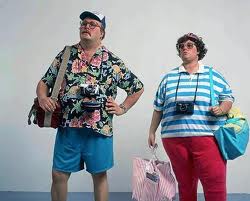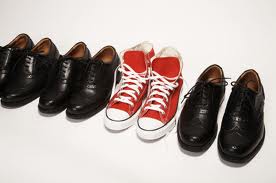Fitting In
Eight Tips for Keeping Your Foot OUT of Your Mouth
How to fit in and have fun when abroad.
Published on June 2, 2011 by N. Darling, Ph.D.
Summer is the season for vacations and, despite high oil prices and a weak dollar, more people are traveling abroad than ever. This is particularly true for younger people from the US, for whom study and travel overseas is becoming a ‘must do’ part of their college experience and a ‘must have’ part of their resumes as they apply to increasingly international businesses.
These are a few thoughts jotted in my notebook from my travels abroad this year . . .
Remember: Everyone is looking at you. This is not just your  imagination or touristy self-consciousness. They really are. I was reminded of that this morning, packed into a rush hour subway car in Santiago Chile. Suddenly the ears of half the people in the car had perked up, and most heads had turned subtly in the direction of one man: a Brit who was speaking in English. He wasn’t speaking loudly. He more or less fit in, although he was a bit taller than most people in the car. But just talking had brought him to the attention of this rush hour crowd. One of the most important things you should remember when traveling abroad is that people notice novelty. And when you’re abroad, the novelty is you. So whatever you do, remember that people are paying attention and act the way you want to be seen.
imagination or touristy self-consciousness. They really are. I was reminded of that this morning, packed into a rush hour subway car in Santiago Chile. Suddenly the ears of half the people in the car had perked up, and most heads had turned subtly in the direction of one man: a Brit who was speaking in English. He wasn’t speaking loudly. He more or less fit in, although he was a bit taller than most people in the car. But just talking had brought him to the attention of this rush hour crowd. One of the most important things you should remember when traveling abroad is that people notice novelty. And when you’re abroad, the novelty is you. So whatever you do, remember that people are paying attention and act the way you want to be seen.
Assume everyone can understand what you’re saying. One of the easiest traps to fall into as a tourist in places where you don’t speak the language is to assume that no one can understand what you say. This is particularly easy when you’re with a friend or – even worse – if you have a cell phone with you and are chatting with someone from home. In any crowd, someone will speak English well enough to understand any nasty remark or subtle slight you voice about the people around you. American David Sedaris has a wonderful story about two American tourists complaining loudly about the hygiene of the French on a Paris subway, using him as a prime example. Don’t be those tourists. Assume everything you say will be heard and understood.
Learn a few words in the language. My Spanish is weak, despite frequent visits to Chile. But I can see the relief on the faces of even those people whose English is pretty good when I flounder through their language instead of making them flounder through mine. Even if you know nothing else, you must be able to say:
- Hello and goodbye
- Please and thank you
- Excuse me
You might also want to say – ‘How kind of you’, ‘I’m sorry for not speaking your language’, ‘I appreciate your helping me’ or ‘Thank you for speaking English’. It’s just courtesy.
Learn the money. This is a weak point for me, which is why I know it’s important. No one ever thinks about what the value of coins or bills are in their own country. You pay for something that costs $4.06 and you pull out a five or four dollars and a dime or whatever appropriate change you have. We expect every kindergartner to recognize coins and every third grader to be able to make change.
Take the ten minutes needed to easily work with the money of the country you’re visiting so that when you’re asked to pay for something, you don’t hand them a $20 bill for a 15 cent purchase or fumble clumsily in a long line with a pile of coins where you have to read the label on each one. It will make you feel SO much more comfortable and provide one less source of annoyance and/or amusement to the cashiers and the people behind you in line. (It will also reduce the likelihood that you’ll be cheated.)
Remember: You are playing against a stereotype.  Stereotypes are preconceived ideas about the way people in certain groups or categories behave. Because the US has such a large presence on the world stage, everyone seems to have an opinion of what Americans are like. Out of our own country, especially in places where Americans are few and far between, people will expect you to be like their preconceived notions from television and movies (What?! You don’t live in a mansion and fire machine guns?).
Stereotypes are preconceived ideas about the way people in certain groups or categories behave. Because the US has such a large presence on the world stage, everyone seems to have an opinion of what Americans are like. Out of our own country, especially in places where Americans are few and far between, people will expect you to be like their preconceived notions from television and movies (What?! You don’t live in a mansion and fire machine guns?).
Importantly, stereotypes will bias people’s perceptions of you because it changes how they interpret neutral behaviors and causes them to selectively attend only to certain aspects of how you present yourself. For example, calling myself an ‘American’ in Chile is often seen as an expression of US imperialism – even if there is no other commonly used word for people from the US in Spanish other than ‘North American’, which, to someone from the US, includes Canada and Mexico. Just go with it.
Stereotypes are most influential in the absence of real, concrete experience. Everything you do helps to change peoples’ stereotype of what people from the US are like – for better or worse. One common stereotype of Americans is arrogance and cultural insensitivity. Perhaps an extra helping of humility and modesty will temper their perception.
Don’t complain. It has been my experience as a US citizen  traveling abroad that many people – especially well-educated ones – feel free to tell you what the US is like and what’s wrong with the country and our foreign policy. Even when I agree with some of what they say, I get mad. It’s kind of like having a sister. It’s okay for you to complain about her, but no one else can.
traveling abroad that many people – especially well-educated ones – feel free to tell you what the US is like and what’s wrong with the country and our foreign policy. Even when I agree with some of what they say, I get mad. It’s kind of like having a sister. It’s okay for you to complain about her, but no one else can.
When you are in another country and complain about the air quality, the way that cashiers function in stores, or the fact that you can’t get good suntan lotion or a decent internet connection, the people around you are going to react defensively. You can ask about those things – that’s different. But complaining about things being different from home is sure to raise self-protective hackles. And besides, didn’t you travel abroad because it WOULD be different?
Be observant and fit in. This is a wonderful exercise for people interested in psychology. Unfortunately, it is more complicated than taking off your shoes in a Japanese household or covering your head in a mosque.
Here’s an example. When my research first took me to Chile ten years ago, I packed my bags with what I thought were professional clothes, got a nice, short professional haircut, and headed to Santiago. I stood out like a sore thumb. First of all, I am tall for a woman in the US. In Chile, I was solidly a head taller than any woman around me. My heels didn’t help. I shed those immediately and put on flats. Second, I realized that no one – and I mean NO woman – wore short hair. I realized my mistake when I first saw a shampoo ad on tv with a woman having all her hair cut off in frustration then gasping in horror when she looked in the mirror – and realized her ‘horrible short’ cut looked just like my typical American one. Then I ran out for a fast errand and saw a girl nudge her mother to point at the American who, her mother remarked disparagingly, looked ‘just like a man’ (thinking other people can’t understand your language is not solely a problem of American tourists). Earrings and scarves helped me fit into the more feminine expectations for dress. I couldn’t change my height or my hair, but looking around a little helped me to figure out what was making me stand out and correct it.
Clothing is another excellent example. In Sweden last summer,  people immediately identified me as from the US because I was wearing a type of sandal common here, but extremely unusual in Europe. In Santiago in the winter, you can look at whole subway cars and only see clothing in black, brown, camel, navy or gray, except for the ubiquitous blue jeans. Wearing a turquoise jacket, a pink blouse, or green tee-shirt is making a statement and clearly marking you as different. Good observational skills can help you blend in, making both you and your companions more comfortable. Sometimes you don’t even know why you’re uncomfortable until you look around carefully, change something, and the feeling goes away.
people immediately identified me as from the US because I was wearing a type of sandal common here, but extremely unusual in Europe. In Santiago in the winter, you can look at whole subway cars and only see clothing in black, brown, camel, navy or gray, except for the ubiquitous blue jeans. Wearing a turquoise jacket, a pink blouse, or green tee-shirt is making a statement and clearly marking you as different. Good observational skills can help you blend in, making both you and your companions more comfortable. Sometimes you don’t even know why you’re uncomfortable until you look around carefully, change something, and the feeling goes away.
How loudly you speak, how close you stand to other people, whether you kiss, shake hands, or bow when greeting, how fast you walk . . . All of these things are a shared aspect of culture. Watch those around you and when in Rome . . .
Eat the food. The reason most people travel to another country is  to experience what life is like in another place. One of the most important aspects of culture is food. Experience it. (Yes, keep safety guidelines in mind – but there’s always SOMETHING you can eat.) If you invited an international visitor to your home for a meal and they refused to eat a hamburger because it didn’t look appetizing to them or it was ‘different’ and they’d never had one before, you’d be insulted or hurt. Food is one of the ways we make guests welcome. Food is one of the ways we represent who we are and one of the great comforts of civilization. When traveling abroad – and always in someone else’s home – eat what is offered. You may find that you love it.
to experience what life is like in another place. One of the most important aspects of culture is food. Experience it. (Yes, keep safety guidelines in mind – but there’s always SOMETHING you can eat.) If you invited an international visitor to your home for a meal and they refused to eat a hamburger because it didn’t look appetizing to them or it was ‘different’ and they’d never had one before, you’d be insulted or hurt. Food is one of the ways we make guests welcome. Food is one of the ways we represent who we are and one of the great comforts of civilization. When traveling abroad – and always in someone else’s home – eat what is offered. You may find that you love it.
If there are things you just can’t bring yourself to eat – either because it is too spicy or against your dietary restrictions or it is just unpalatable (goats eyes come to mind) – find something you can. Don’t flunk lunch. Rice, pastas, potatoes, bread, and crackers are remarkably ubiquitous. And it is amazing how you can fill yourself up with starches, smile and eat, while pushing things around your plate that you can’t bring yourself to swallow. And no one else will notice.
In summary . . .
Being away will help you see your home more clearly. Years ago, when I first went on the job market, I suddenly realized that I was ‘from the Northeast’ when I finally got far enough away from it to realize that things in Texas and Utah and Alabama were different from what I was used to. Traveling abroad can be like that and more so. And that’s a great opportunity for psychological observation.
Postscript: One thing I am always aware of when I get back to the States is that for many people who are visible minorities or who come from backgrounds different from the ‘mainsteam’ in which they are moving, this is their experience every single day. More food for thought.




